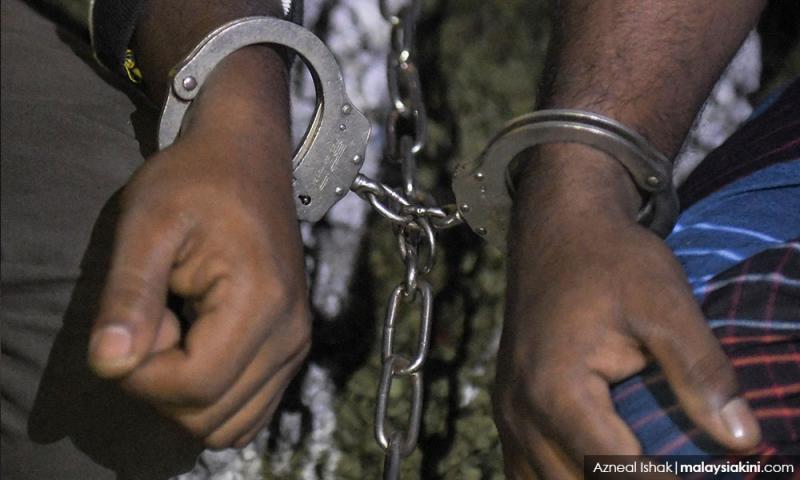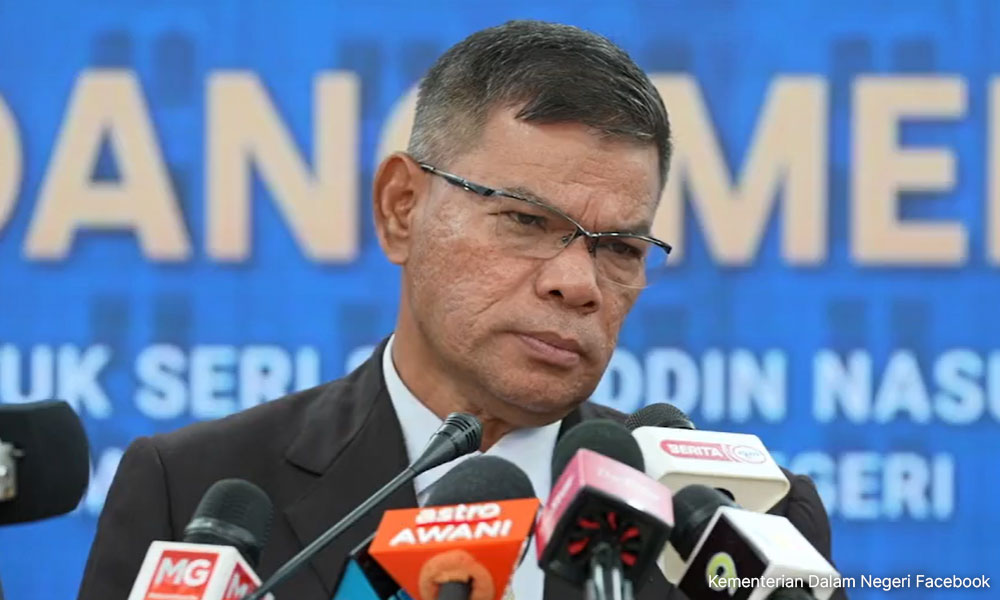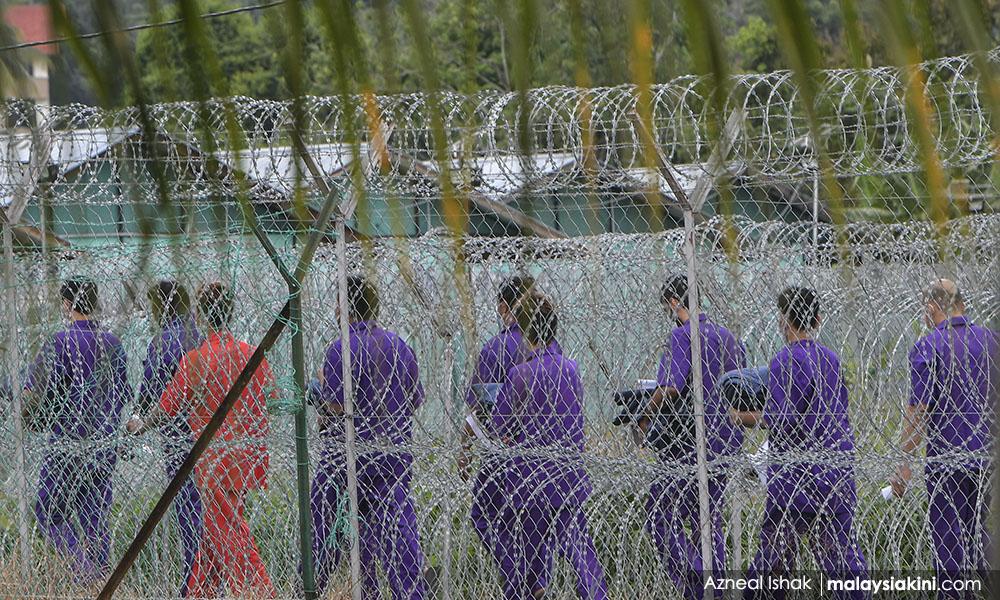
S Thayaparan
Security Offences (Special Measures) Act (Sosma), which critics have described as draconian, provides that “any statement by an accused whether orally or in writing to any person at any time” can be admitted into evidence, with no exception for evidence obtained under duress.
COMMENT | I have no idea why Home Minister Saifuddin Nasution Ismail would defend something like Sosma.
I get that there are certain cabals within the state security apparatus who approve of laws like Sosma for obvious reasons - but ditching this law should be an easy win for the Pakatan Harapan-led unity government.
And, really, all the home minister should have said was that Sosma was under a moratorium until it could be studied further and slowly phased out.
If he wanted to show government support for the state security apparatus, what he should have done is assure the state security apparatus, especially the police, that the government was looking into the welfare of their personnel and devising methods to ease their burdens during these economic trying times, namely when it comes to issues such as housing, salary and professional welfare.
This way, the government is not endorsing draconian laws and the optics of looking after the welfare of security personnel way down on the totem pole becomes the focus of this new government, instead of not spooking the right-wing elements of this country who support this law.
Instead, what Saifuddin did was not only tell folks that the Reformasi agenda means bupkis but also enabled the right-wing forces in this country, who approve of such laws because they understand that such laws do not apply to them.
Security Offences (Special Measures) Act (Sosma), which critics have described as draconian, provides that “any statement by an accused whether orally or in writing to any person at any time” can be admitted into evidence, with no exception for evidence obtained under duress.
- Former Petaling Jaya MP Maria Chin Abdullah
COMMENT | I have no idea why Home Minister Saifuddin Nasution Ismail would defend something like Sosma.
I get that there are certain cabals within the state security apparatus who approve of laws like Sosma for obvious reasons - but ditching this law should be an easy win for the Pakatan Harapan-led unity government.
And, really, all the home minister should have said was that Sosma was under a moratorium until it could be studied further and slowly phased out.
If he wanted to show government support for the state security apparatus, what he should have done is assure the state security apparatus, especially the police, that the government was looking into the welfare of their personnel and devising methods to ease their burdens during these economic trying times, namely when it comes to issues such as housing, salary and professional welfare.
This way, the government is not endorsing draconian laws and the optics of looking after the welfare of security personnel way down on the totem pole becomes the focus of this new government, instead of not spooking the right-wing elements of this country who support this law.
Instead, what Saifuddin did was not only tell folks that the Reformasi agenda means bupkis but also enabled the right-wing forces in this country, who approve of such laws because they understand that such laws do not apply to them.

Home Minister Saifuddin Nasution Ismail
There is this meme spreading around Harapan supporters, who now think that these laws are needed to curtail the religious and racial excesses of the Malay far right. These people are delusional.
What I have argued, and so have many other legal and security professionals, and academics across the ideological divide – some of whom were detained under these laws, and political operatives who were also detained – is that there are enough legal provisions to maintain safety and security, provided a professional and impartial state security apparatus does its job without resorting to such immoral, undemocratic measures.
And yes these measures, although convenient, have more often than not been abused for the benefit of the political elites of this country or have been used on the disenfranchised of this country who do not have access to the legal system that privilege provides.
I have often argued that terrorism – especially religious terrorism – should be dealt with as a criminal enterprise and there are enough laws to handle such crimes, without the need for special laws that, in reality, threaten democratic first principles and institutions. Indeed even in the West, such laws are used to stifle dissent.
Obnoxious laws
There is some safety if you are a political operative or a well-known social activist - but, for the rest of us, the rules do not apply.
From reportage in 2016, it was stated one detainee, in particular, was threatened at gunpoint during questioning, forced to strip naked and sexually harassed by officers.
"This detainee was stripped and bent over, his anus caressed with a water bottle.
“Another detainee was forced to strip and forced to bend over to be sodomised,” said Suaram executive director Sevan Doraisamy, who added that he was unsure whether the actual act was carried out or otherwise.
There is this meme spreading around Harapan supporters, who now think that these laws are needed to curtail the religious and racial excesses of the Malay far right. These people are delusional.
What I have argued, and so have many other legal and security professionals, and academics across the ideological divide – some of whom were detained under these laws, and political operatives who were also detained – is that there are enough legal provisions to maintain safety and security, provided a professional and impartial state security apparatus does its job without resorting to such immoral, undemocratic measures.
And yes these measures, although convenient, have more often than not been abused for the benefit of the political elites of this country or have been used on the disenfranchised of this country who do not have access to the legal system that privilege provides.
I have often argued that terrorism – especially religious terrorism – should be dealt with as a criminal enterprise and there are enough laws to handle such crimes, without the need for special laws that, in reality, threaten democratic first principles and institutions. Indeed even in the West, such laws are used to stifle dissent.
Obnoxious laws
There is some safety if you are a political operative or a well-known social activist - but, for the rest of us, the rules do not apply.
From reportage in 2016, it was stated one detainee, in particular, was threatened at gunpoint during questioning, forced to strip naked and sexually harassed by officers.
"This detainee was stripped and bent over, his anus caressed with a water bottle.
“Another detainee was forced to strip and forced to bend over to be sodomised,” said Suaram executive director Sevan Doraisamy, who added that he was unsure whether the actual act was carried out or otherwise.

Keep in mind that the default position of the state security apparatus and the political class is that (1) all reports of malfeasances are fabrications, and (2) show us proof.
Just two years ago, one of the few truth speakers to power wrote about these obnoxious laws when it came to the state’s persecution of Malacca state executive councillor G Saminathan for his supposed link with the LTTE.
Penang Deputy Chief Minister II P Ramasamy said: “In the ultimate sense, it is not about the court judgment or Sosma but whether the Pakatan Harapan government is willing to tolerate and condone the obnoxious laws of the country, that were supposed to have been removed per the election manifesto.”
Indeed imposing a moratorium on such laws buys Harapan more time to carry out structural reforms when it comes to the welfare of vox populi in the state security apparatus and a signal to the Harapan base that reforms are taking place.
This would ensure that the system undergoes revision but it is not some kind of shock therapy.
Instead, what the home minister did was pit the reform-minded forces in this country against his ministry, hoping that a spooked Harapan base would go along with anything he says in the service of not causing any problems for the unity government.
In other words, people who were originally opposed to such laws would remain silent in the absence of reform because they did not want to spook Perikatan Nasional.
And who knows, he may be right. After all, some in the Harapan base think these laws will be used on the people who make religious and racial provocations and they would be right. The problem is that the state and PN define racial and religious provocations as people who argue for egalitarianism and secularism.
And this is really the problem because the Harapan base wants to give this unity government a chance, but between being told not to whine and the provocations of PN, the last thing this Harapan-led government should be doing is mismanaging reform by abandoning whatever separates it from PN.
I mean it's right there in one of the objectives of the Rukun Negara - Memelihara cara hidup demokratik (Preserving a democratic way of life).
S THAYAPARAN is Commander (Rtd) of the Royal Malaysian Navy. Fīat jūstitia ruat cælum - “Let justice be done though the heavens fall.”

No comments:
Post a Comment